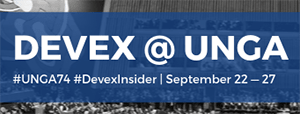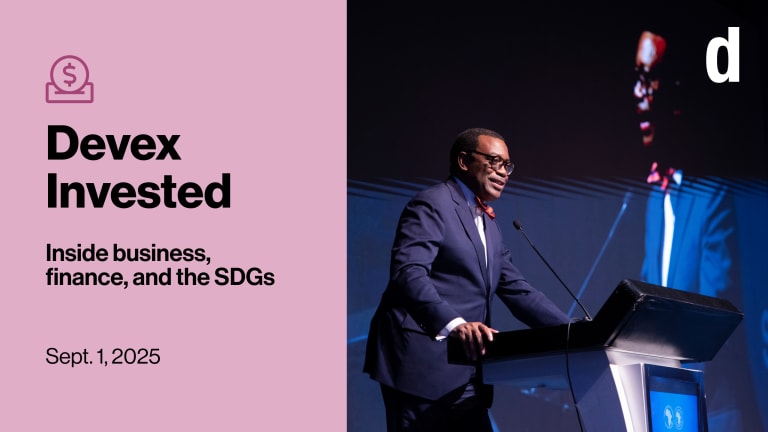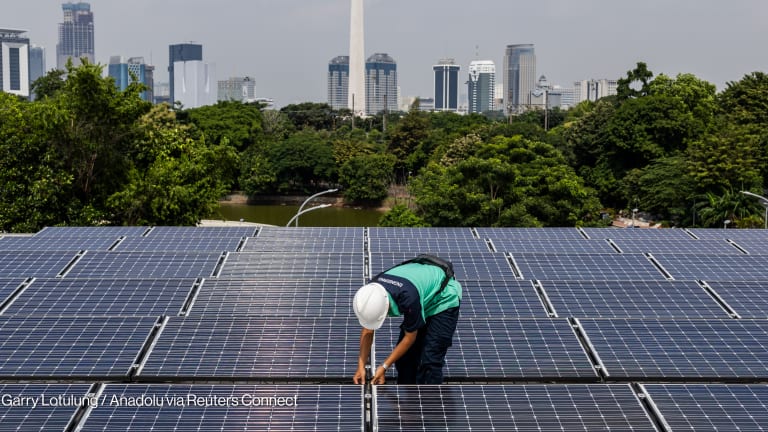
NAIROBI — The African Development Bank will no longer finance coal projects, bank president Akinwumi Adesina announced this week at the U.N. Climate Action Summit. It was the first public announcement by the bank committing to end financial support for coal.
“Coal is the past, renewable energy is the future,” Adesina told the audience. “For us at the African Development Bank, we are getting out of coal.”
The last coal investment the bank made, which was in 2015, was a supplementary loan of about $4 million for a small, 125 megawatt coal-fired power plant in Senegal that it originally financed in 2009, according to Oil Change International, a U.S.-based advocacy organization.
“We really feel strongly that at the African Development Bank … what we should be focusing in on is a lot of clean energy, renewable energy.”
— Akinwumi Adesina, president, African Development BankAdesina’s commitment puts the AfDB in the footsteps of other multilateral development banks that have severed support for coal projects. The World Bank Group, the European Bank for Reconstruction and Development, and the European Investment Bank now all have explicit policies that exclude coal from their portfolios, according to Oil Change International. Senior personnel at the Asian Development Bank and Asia Infrastructure Investment Bank have also made statements indicating they do not intend to finance further coal projects.
The European Investment Bank has a draft policy currently being considered that would end all of their fossil fuel financing beyond 2020. The draft is due for a decision this fall.

Activism. UHC. Climate. Read more of Devex's coverage from the 74th U.N. General Assembly.
“It's good to see the African Development Bank catching up with a lot of the other multilateral development banks that have already committed to move away from coal,” said Alex Doukas, the lead analyst at Oil Change International.
Earlier this year, AfDB committed to doubling its climate financing to $25 billion by 2025 — nearly half of which will be devoted to climate adaptation, according to Adesina.
“We really feel strongly that at the African Development Bank … what we should be focusing in on is a lot of clean energy, renewable energy,” he told Devex in an interview in New York.
The bank has a variety of financial instruments that support countries in the development of their renewable sectors and also helps them with adaptation.
It has a $500 million “green baseload” loan facility, for example, that provides concessional finance and technical assistance to countries aiming to increase their renewable energy portfolios and a $250 million disaster risk financing facility that includes funds for insurance premiums for low-income countries hit by climate-induced disasters, Adesina said during his speech at the U.N. The bank also has a $500 million debt fund aimed at small-scale renewable energy projects that aim to create energy inclusion for low-income communities.
In the Sahel region of Africa, the bank is investing $20 billion in the construction of a 10,000 megawatt solar zone — making it the largest in the world — that will cover 11 countries, he said at the U.N.
“It will allow us to power the whole of the Sahel using the power of the sun,” he said.
The bank had been recently considering a plan to finance a coal powered plant in Lamu, Kenya, which civil society groups have been fighting against for years. In June, the nation’s supreme court blocked the project, saying that a proper environmental assessment was not conducted.
But while AfDB is now committed to not financing coal, it is still involved in financing other fossil fuel projects. For example, late last year it approved a loan for a heavy fuel oil power plant in Senegal.
Beyond fossil fuels, the bank is also supporting the controversial Grand Inga Dam project in Democratic Republic of the Congo. The bank already gave $75 million to prepare the Inga 3 project, the first phase of the mega dam project, Adesina told Devex.
“We are seeing a lot of protests from communities around issues of displacement and around issues of how the energy that will be generated from the dam will not benefit the immediate community, instead it’s more for driving a commercial interest,” said Thuli Makama, Africa senior advisor at Oil Change International. “It doesn't make energy access for the last-mile communities any better.”
Adesina said these concerns are overblown.
"You have something that can power all of Africa, and we've just never exploited it. It doesn't make sense," he told Devex. "I think that we need to provide energy, be responsible and responsive to environmental and social issues. But we do need to optimize what we have.”
Devex reporter Michael Igoe contributed reporting from New York.
Activism. UHC. Climate. Read more of Devex's coverage from the 74th U.N. General Assembly.








